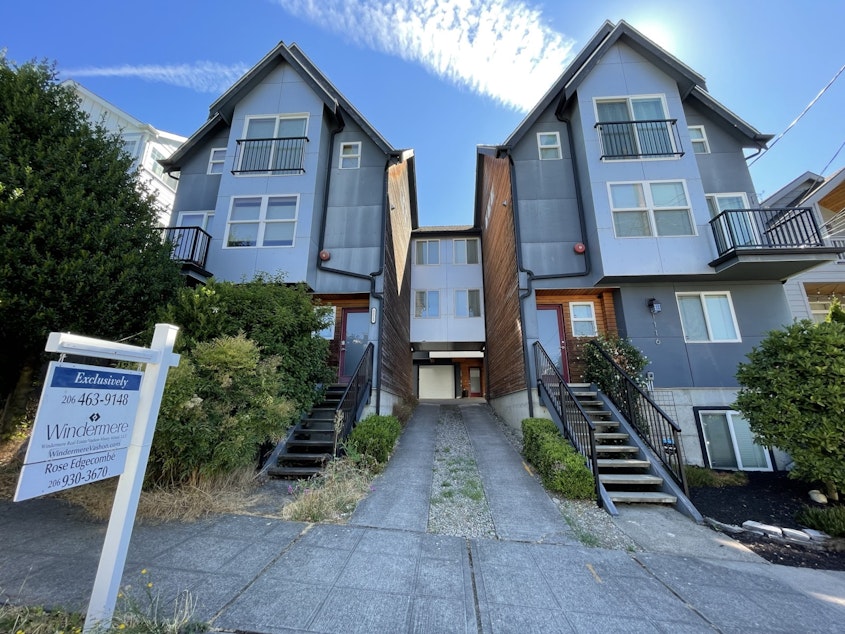Racist covenants excluded many from homeownership. WA lawmakers seek to remedy 'decades of direct harms'

Homebuyers from historically marginalized groups may be getting some help with their down payments.
That’s the goal of a bill making its way through the Washington State Legislature. It survived a crucial vote last week and now goes to the Senate.
I
f you own a home in Washington state, and you take a look at the deed, you might see a phrase saying the land may not be sold to Black, Native American, or Jewish families. Many deeds simply say the property may only be sold to white or “Caucasian” buyers, but others were far more specific, excluding people from countries like Japan, China, India, or Ethiopia (by which the lawyers writing the deed probably meant the entire continent of Africa).
These “racially restrictive covenants” often included language proclaiming the restrictions would stick to the land forever. But on April 11, 1968, the federal Fair Housing Act stripped away their legal power. Washington state adopted its own version of the law in 1969.
While the covenants may not be enforced anymore, the vestigial language remains on those deeds, a palimpsest of a racist past that’s difficult to expunge. Homeowners can currently use a simple, notarized document to begin a process that verifies the language on their specific deed is legally inert. But to physically remove the language from the deed, a homeowner must bring a lawsuit.
It’s a reminder that, even with the passing of the Fair Housing Act, the legacy of those racist covenants persists today, in other forms.
Today, it’s still much harder for Black and Latino families to get loans than white families. The reasons can be traced, in part, to the times when marginalized groups were legally excluded from property ownership. HB 1474 would create "the Covenant Homeownership Account and Program," which would attempt "to remedy some of those past harms."
“I have been a part of many a public hearing in this fine body, and I don’t know if there’s going to be one that’s more impactful than this one,” said Rep. Strom Peterson (D-Edmonds), chair of the House housing committee as he introduced the bill’s prime sponsor, Rep. Jamila Taylor (D-Federal Way).
“This bill addresses the decades — the decades of direct harms inflicted by our state on Washington residents,” Taylor said.
RELATED: What to do about low Black homeownership in Washington state
Here’s how the House Bill 1474 would work if enacted into law: If you’re a member of a marginalized group that was once targeted by racist covenants, and if you can trace your family’s presence in Washington back to a date prior to April 11, 1968, you can get help paying for a down payment and closing costs on the purchase of your first home.
The money should start flowing to homebuyers in 2024.
But first, the program will take the rest of 2023 to study the problem and produce a report. At first glance, this may seem an inappropriate delay, given the urgency of the problem. But a source at the Washington State Housing Finance Commission, which will likely administer the fund, says great care is necessary to make sure the program is executed legally.
Other states have failed to create race-based programs like this — just look at the fate of affirmative action in higher education. In today’s political environment, a legal challenge could take this law to the U.S. Supreme Court.
The report due at the end of 2023 will play a critical role in giving this law the best legal footing. The report must document Washington state’s complicity in the creation and support of racial covenants, so that the proposed aid to homebuyers may be understood as an appropriately responsive legal remedy.
If Washington succeeds at building a program that can survive legal challenges, it could become a model for other states, and could help reshape distribution of funds in existing programs in Washington state. For example, Washington already has an $80 million a year program to help first-time homebuyers. But the inability to consider race limits the fund’s ability to address wrongs that were historically targeted at specific races.
RELATED: Displacement is a big problem in Seattle. Subsidized apartments help, but only somewhat
The proposed new fund, which would be known as the Covenant Homeownership Account, would generate an estimated $100 million a year after the first year.
The planned study will shape exactly what form the aid takes, but if it’s similar to existing programs run by government and nonprofits, it would likely come in the form of an extremely low-interest (1%) loan, that would be combined with other funding sources in a “second mortgage” that covers the down payment and closing costs.
Opposition to the bill has been quiet. At the appropriations committee hearing, the only challenge question came from Rep. Joe Schmick (R-Ritzville), who asked if the fee would be in addition to of other fees already assessed on the recording of legal documents. KUOW contacted Rep. Schmick’s office to learn if fees were his primary concern, but was told Schmick was too busy with floor votes to respond.
On March 2, the bill survived its floor vote in the Washington State House of Representatives, and moves now to the state Senate.

